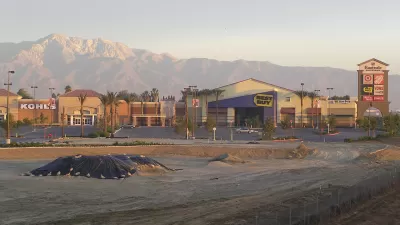So says the Lincoln Institute of Land Policy, releasing a new report that says this all-too-common strategy rarely pays off.
Report authors Daphne A. Kenyon, Adam H. Langley, and Bethany P. Paquin explain that there are three obstacles to successful property tax incentives:
"First, incentives are unlikely to have a significant impact on a firm's profitability since property taxes are a small part of the total costs for most businesses-averaging much less than 1 percent of total costs for the U.S. manufacturing sector. Second, tax breaks are sometimes given to businesses that would have chosen the same location even without the incentives. When this happens, property tax incentives merely deplete the tax base without promoting economic development. Third, widespread use of incentives within a metropolitan area reduces their effectiveness, because when firms can obtain similar tax breaks in most jurisdictions, incentives are less likely to affect business location decisions."
The authors say that strategies that work better for long-term economic development include "...customized job training, labor market intermediaries, and business support services."
The full report is available as a free PDF download.
FULL STORY: Property tax giveaways in Boston are a popular, and flawed, business lure

Trump Administration Could Effectively End Housing Voucher Program
Federal officials are eyeing major cuts to the Section 8 program that helps millions of low-income households pay rent.

Planetizen Federal Action Tracker
A weekly monitor of how Trump’s orders and actions are impacting planners and planning in America.

Ken Jennings Launches Transit Web Series
The Jeopardy champ wants you to ride public transit.

‘Minnesota Nice’ Isn’t so Nice When You Can’t Find a Place to Live
The Economic Development and Housing Challenge Program can help address the scourge of homelessness among Indigenous people.

NYC Open Streets Organizers Call for City Support
The number of open streets projects has dropped year after year as volunteer groups struggle to fund and staff them.

Crime Continues to Drop on Philly, San Francisco Transit Systems
SEPTA and BART both saw significant declines in violent crime in the first quarter of 2025.
Urban Design for Planners 1: Software Tools
This six-course series explores essential urban design concepts using open source software and equips planners with the tools they need to participate fully in the urban design process.
Planning for Universal Design
Learn the tools for implementing Universal Design in planning regulations.
Heyer Gruel & Associates PA
Ada County Highway District
Institute for Housing and Urban Development Studies (IHS)
City of Grandview
Harvard GSD Executive Education
Toledo-Lucas County Plan Commissions
Salt Lake City
NYU Wagner Graduate School of Public Service





























